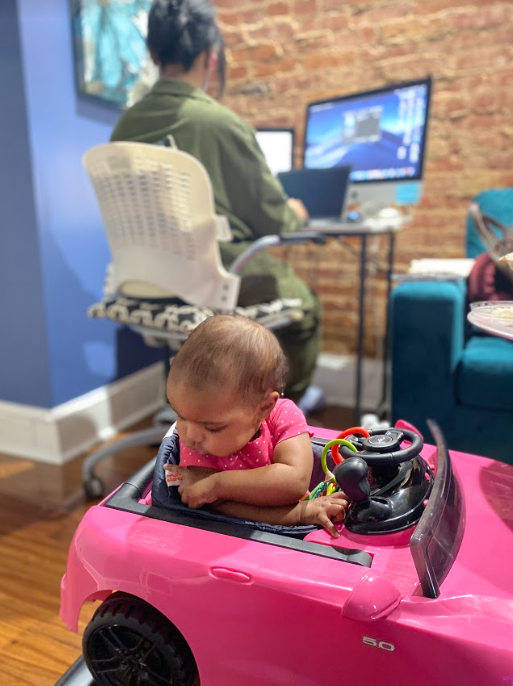The Weight We Weren’t Meant to Carry: A Reflection on Black Womanhood, Work, and Worth
Recently, I was reading a book that opened my eyes to a sobering truth: in America, laws were intentionally crafted to keep Black women from having the same domestic opportunities as white women. Under the umbrella of Jim Crow, subcategories like Forced Labor, Black Codes, and Vagrancy Statutes were used to limit our ability to rest, stay home, and be supported by our partners the way white women often were.
Today, I want to talk about how the residue of those laws still clings to us and how we see it show up in our workplaces, relationships, motherhood, and the very way we view ourselves.
The Workplace and the “Strong Black Woman” Lie
I work in a role where I’m surrounded by kind and brilliant people. And yet, like so many Black women in corporate America, I often feel the burden of being seen as strong, tireless, and unshakeable whether I want to be or not.
I’ve watched others freely express frustration about their workload, management, or unclear processes without fear of being labeled “angry” or “incompetent.” Meanwhile, Black women are expected to smile through confusion, stress, and burnout. If we slip up, our mistakes are magnified. If we speak up, we risk being silenced or worse, mischaracterized.
For years, I mastered the art of code-switching. I thought I was coping, maybe even thriving. But lately, the toll has caught up with me. In many spaces, we’re expected to overachieve with little support. We’re encouraged to downplay our personal struggles so that others can feel comfortable while we drown quietly under the weight of performance and perfectionism.
And let’s be clear: these challenges don’t just come from white colleagues. Internalized biases exist across all racial lines. The expectation that Black women are built to “take it” often comes from every direction.
Black Love Under Pressure
Let’s talk relationships. From a young age, I was taught in church that my body was a temple and that every man who touched it reduced its value. Meanwhile, boys were rarely given the same message. They were praised for their conquests, while girls were shamed for having a past.
This double standard didn’t come out of nowhere. It’s rooted in a legacy designed to dismantle our community. Jim Crow and even documents like the Willie Lynch Letter fed the idea that Black families should be divided, that Black women should be distrusted, and that Black men shouldn't carry the burden of care and provision.
Today, Black women are called gold diggers for simply wanting a partner who can provide. We’re criticized for wanting to be stay-at-home moms. And our bodies? Constantly objectified. But once we’ve been touched, or become mothers, we’re seen as "damaged goods." It's a vicious cycle, and it hurts.
Black Women Deserve Rest
There’s this saying we all grew up hearing: “You have to work ten times harder because you’re Black.” But when I started displaying that work ethic at a young age, I was told I was “too grown.”
I remember dressing up in a full suit briefcase and all for my first job interview at 14. I wanted to show I was serious. But now, years later, I realize many of the doors I worked so hard to open were exhausting, not empowering.
Since the last election, I’ve made a decision: I’m putting my cape down.
No more people-pleasing. No more working myself to the bone just to prove I'm worthy. This isn’t about laziness it’s about boundaries. I deserve rest. I deserve care. I deserve to be nurtured, supported, and seen.
Like a plant, I need watering. I need sunlight. I need pruning, replanting, and gentleness. And when those needs are met, I flourish.
Motherhood Reimagined
Becoming a mother to two beautiful daughters has changed everything for me.
It made me realize that the voice I use with myself becomes the voice they hear in their heads. I am determined to break the generational patterns that teach Black women to accept less under the guise of being “strong” or “simple.”
I’ve rejected the mindset that says, “those kids are yours,” as if I didn’t create them with someone else. I refuse to be the overworked, overstimulated mother society praises but never supports.
My children’s father now has them on Tuesdays, Thursdays, and every other weekend. When I shared this with my dad, he felt it might be “too much transition” for the girls. But I responded honestly: “I’m not built like my mother. I need my breaks.”
We say “it takes a village,” but we leave dads out of the equation far too often. I'm not man-bashing because I once believed these old ideas, too. But now, I see clearly: Black women deserve help. We deserve rest. We deserve to heal.
I’m committed to giving my daughters a childhood they don’t have to recover from and that starts with me reclaiming balance.
Final Thoughts
So the next time you feel the urge to judge a Black woman for:
-
Wanting to marry someone who’s equally (or more) established,
-
Letting her children’s father carry his share of the load,
-
Or daring to speak up in her workplace...
I encourage you to pause. Sit with that discomfort. Trace it back to where it started. Ask yourself why it bothers you.
And to every Black woman out there in survival mode overworked, overwhelmed, and under-supported, I see you. I’m praying that God sends you the support you need, the rest you deserve, and the strength to stop carrying what was never yours to hold.
You were never meant to do it all alone.
Much love,
Xavia the Know-It-All, Who Knows Nothing at All




Comments
Post a Comment